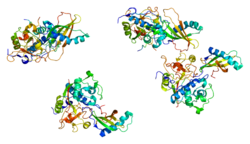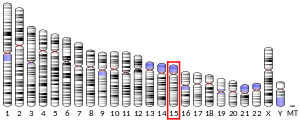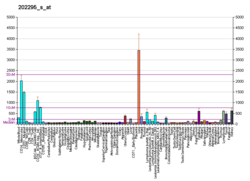Katepsin H
Katepsin H – katepsin B3, benzoilarginin-naftilamidna hidrolaza (BANA), katepsin Ba, aleurain, N-benzoilarginin-beta-naftilamidna hidrolaza – je proteinski enzim EC 3.4.22.16 koji je kod ljudi kodiran sa gen CTSH.[5][6][7][8][9]
Protein kojeg kodira ovaj gen je lizosomna cistein proteinaza, važna u ukupnom razlaganju lizosomnih proteina. Sastoji se od dimera od disulfidno-povezanih teških i lahkih lanaca, oba proizvedena iz jednog prekursorskog proteina. Kodirani protein, koji pripada proteinskoj porodici peptidaza C1, može djelovati i kao aminopeptidaza i kao endopeptidaza. Povećana ekspresija ovog gena je u korelaciji sa malignom progresijom tumora prostate. Dvije varijante transkripta kodirane su iz različitih izoformi ovog gena.[10][11][12]
Također pogledajte
urediReference
uredi- ^ a b c GRCh38: Ensembl release 89: ENSG00000103811 - Ensembl, maj 2017
- ^ a b c GRCm38: Ensembl release 89: ENSMUSG00000032359 - Ensembl, maj 2017
- ^ "Human PubMed Reference:". National Center for Biotechnology Information, U.S. National Library of Medicine.
- ^ "Mouse PubMed Reference:". National Center for Biotechnology Information, U.S. National Library of Medicine.
- ^ Alberts B. (2002)ː Molecular biology of the cell. Garland Science, New York, ISBN 0-8153-3218-1.
- ^ Bajrović K, Jevrić-Čaušević A., Hadžiselimović R., Ed. (2005): Uvod u genetičko inženjerstvo i biotehnologiju. Institut za genetičko inženjerstvo i biotehnologiju (INGEB), Sarajevo, ISBN 9958-9344-1-8.
- ^ Voet D., Voet J. (1995): Biochemistry, 2nd Ed. Wiley, http://www.wiley.com/college/math/chem/cg/sales/voet.html.
- ^ Kapur Pojskić L., Ed. (2014): Uvod u genetičko inženjerstvo i biotehnologiju, 2. izdanje. Institut za genetičko inženjerstvo i biotehnologiju (INGEB), Sarajevo, ISBN 978-9958-9344-8-3.
- ^ Međedović S., Maslić E., Hadžiselimović R. (2000): Biologija 2. Svjetlost, Sarajevo, ISBN 9958-10-222-6.
- ^ Barrett, A.J. and Kirschke, H. (1981). "Cathepsin B, cathepsin H and cathepsin L". Methods Enzymol. 80: 535–561. PMID 7043200.CS1 održavanje: više imena: authors list (link)
- ^ Brömme, D., Bescherer, K., Kirschke, H. and Fittkau, S. (1987). "Enzyme-substrate interactions in the hydrolysis of peptides by cathepsins B and H from rat liver". Biochem. J. 245: 381–385. PMID 3663163.CS1 održavanje: više imena: authors list (link)
- ^ Fuchs, R., Machleidt, W. and Gassen, H.G. (1988). "Molecular cloning and sequencing of a cDNA coding for mature human kidney cathepsin H". Biol. Chem. Hoppe-Seyler. 369: 469–475. PMID 2849458.CS1 održavanje: više imena: authors list (link)





